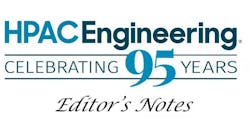To give the green-building industry more time to prepare for LEED v4, the latest version of the LEED rating system, which features increased rigor and multiple updates, the U.S. Green Building Council (USGBC) recently extended the date to which users can register projects under LEED 2009 from June 15, 2015, to Oct. 31, 2016.
“When USGBC launched LEED v4 last year, we set out with one goal in mind: to raise the bar in a way that challenges the building industry to reach higher than ever before,” Rick Fedrizzi, chief executive officer and founding chair, USGBC, said. “... However, the market has requested additional time to prepare for LEED v4, so we are responding.”
In a survey conducted during last month’s Greenbuild conference, 61 percent of respondents said they are “not ready” or “unsure” if they are ready to pursue LEED v4.
“Our international LEED users, which account for some 50 percent of new LEED registrations, have also indicated they would like to have more time to move on to the new rating system,” Fedrizzi noted. “This extension will be especially helpful to them.”
LEED v4 has been in the market for nearly a year and will remain available for those who are ready.
“LEED v4 wasn’t designed to be easy,” Fedrizzi said. “It is the next generation of green building, and we are confident the market will meet us there as they have in years past. ... With LEED, we have a responsibility to set a high bar, and we know that many leaders are capable of reaching it presently or in the very near future. We want to support our LEED users as they move the market forward with us, and allowing them to utilize the LEED 2009 rating system for a little longer will help facilitate that.”









